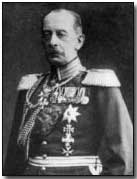Who's Who - Alfred von Schlieffen
 Alfred von Schlieffen (1833-1913) was
the German Field Marshal who, as chief of the general staff from 1891-1905,
was responsible for devising the
Schlieffen Plan, upon which German strategy
at the outbreak of the war was unsuccessfully based. Debate continues
today as to whether the plan itself was flawed, or whether its execution was
flawed.
Alfred von Schlieffen (1833-1913) was
the German Field Marshal who, as chief of the general staff from 1891-1905,
was responsible for devising the
Schlieffen Plan, upon which German strategy
at the outbreak of the war was unsuccessfully based. Debate continues
today as to whether the plan itself was flawed, or whether its execution was
flawed.
Schlieffen, born on 28 February 1833, was the son of a Prussian general, and entered the army himself in 1854. Quickly moving to the general staff he participated in the Seven Weeks War against Austria in 1866 and in the Franco-Prussian War of 1870-71.
In 1884 Schlieffen became head of the military history section of the general staff, replacing Alfred, Graf von Waldersee as chief of the Great General Staff in 1891.
The Schlieffen Plan provided for a war on two front, West and East, by first quickly defeating France through a concentration of troops on the Western Front, which by moving rapidly through Belgium and Holland would defeat France in a flanking movement (overwhelmingly so on its right). Meanwhile a smaller army would hold off Russia in the east.
The plan disregarded Belgian and Dutch neutrality and required boldness in its execution. Once war actually broke out the plan was initiated in a modified form, but a number of factors led to its failure, including German lack of mobility, increased Russian numbers, effective French resistance - and the reluctance of Schlieffen's successor, Helmuth von Moltke, to weaken his Eastern Front.
During World War Two a variation of the Schlieffen Plan was again employed by Germany which, in the absence of Russian opposition, proved successful.
Alfred von Schlieffen died on 4 January 1913 in Berlin.
"When you march into France, let the last man on the right brush the Channel with his sleeve"
- Referring to the Schlieffen Plan
A "blimp" was a word applied to an observation balloon.
- Did you know?
